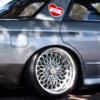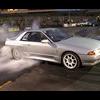GTS4 RB20 clunks while shutting off?
Announcements
-
Similar Content
-
Latest Posts
-
Thanks for the reply mate. Well I really hope its a hose then not engine out job
-
But.... the reason I want to run a 60 weight is so at 125C it has the same viscosity as a 40 weight at 100C. That's the whole reason. If the viscosity changes that much to drop oil pressure from 73psi to 36psi then that's another reason I should be running an oil that mimics the 40 weight at 100C. I have datalogs from the dyno with the oil pressure hitting 73psi at full throttle/high RPM. At the dyno the oil temp was around 100-105C. The pump has a 70psi internal relief spring. It will never go/can't go above 70psi. The GM recommendation of 6psi per 1000rpm is well under that... The oil sensor for logging in LS's is at the valley plate at the back of the block/rear of where the heads are near the firewall. It's also where the knock sensors are which are notable for 'false knock'. I'm hoping I just didn't have enough oil up top causing some chatter instead of rods being sad (big hopium/copium I know) LS's definitely heat up the oil more than RB's do, the stock vettes for example will hit 300F(150C) in a lap or two and happily track for years and years. This is the same oil cooler that I had when I was in RB land, being the Setrab 25 row oil cooler HEL thing. I did think about putting a fan in there to pull air out more, though I don't know if that will actually help in huge load situations with lots of speed. I think when I had the auto cooler. The leak is where the block runs to the oil cooler lines, the OEM/Dash oil pressure sender is connected at that junction and is what broke. I'm actually quite curious to see how much oil in total capacity is actually left in the engine. As it currently stands I'm waiting on that bush to adapt the sender to it. The sump is still full (?) of oil and the lines and accusump have been drained, but the filter and block are off. I suspect there's maybe less than 1/2 the total capacity there should be in there. I have noticed in the past that topping up oil has improved oil pressure, as reported by the dash sensor. This is all extremely sketchy hence wanting to get it sorted out lol.
-
I neglected to respond to this previously. Get it up to 100 psi, and then you'll be OK.
-
I agree with everything else, except (and I'm rethinking this as it wasn't setup how my brain first though) if the sensor is at the end of a hose which is how it has been recommended to isolate it from vibrations, then if that line had a small hole in, I could foresee potentially (not a fluid dynamic specialist) the ability for it to see a lower pressure at the sensor. But thinking through, said sensor was in the actual block, HOWEVER it was also the sensor itself that broke, so oil pressure may not have been fully reaching the sensor still. So I'm still in my same theory. However, I 100% would be saying COOL THE OIL DOWN if it's at 125c. That would be an epic concern of mine. Im now thinking as you did Brad that the knock detection is likely due to the bearings giving a bit more noise as pressure dropped away. Kinkstah, drop your oil, and get a sample of it (as you're draining it) and send it off for analysis.
-
I myself AM TOTALLY UNPREPARED TO BELIEVE that the load is higher on the track than on the dyno. If it is not happening on the dyno, I cannot see it happening on the track. The difference you are seeing is because it is hot on the track, and I am pretty sure your tuner is not belting the crap out of it on teh dyno when it starts to get hot. The only way that being hot on the track can lead to real ping, that I can think of, is if you are getting more oil (from mist in the inlet tract, or going up past the oil control rings) reducing the effective octane rating of the fuel and causing ping that way. Yeah, nah. Look at this graph which I will helpfully show you zoomed back in. As an engineer, I look at the difference in viscocity at (in your case, 125°C) and say "they're all the same number". Even though those lines are not completely collapsed down onto each other, the oil grades you are talking about (40, 50 and 60) are teh top three lines (150, 220 and 320) and as far as I am concerned, there is not enough difference between them at that temperature to be meaningful. The viscosity of 60 at 125°C is teh same as 40 at 100°C. You should not operate it under high load at high temperature. That is purely because the only way they can achieve their emissions numbers is with thin-arse oil in it, so they have to tell you to put thin oil in it for the street. They know that no-one can drive the car & engine hard enough on the street to reach the operating regime that demands the actual correct oil that the engine needs on the track. And so they tell you to put that oil in for the track. Find a way to get more air into it, or, more likely, out of it. Or add a water spray for when it's hot. Or something. As to the leak --- a small leak that cannot cause near catastrophic volume loss in a few seconds cannot cause a low pressure condition in the engine. If the leak is large enough to drop oil pressure, then you will only get one or two shots at it before the sump is drained.
-







Recommended Posts
Create an account or sign in to comment
You need to be a member in order to leave a comment
Create an account
Sign up for a new account in our community. It's easy!
Register a new accountSign in
Already have an account? Sign in here.
Sign In Now